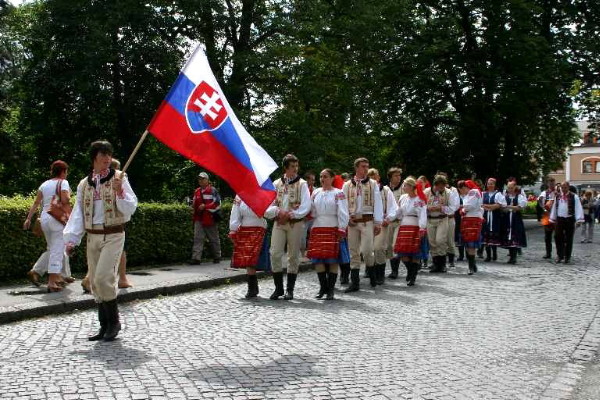Slovaks
Slovaks [Ukrainian: словаки; slovaky]. A people belonging to the West Slavs. Linguistically Slovaks are closely related to the Czechs. Since the dispersal of the Slavic tribes in the 6th and 7th centuries from their original homeland between the upper Vistula and middle Dnieper regions, the Slovaks have inhabited the southern slopes of the Carpathian Mountains, especially its western ranges. In 2012 about 5,400,000 Slovaks lived in Slovakia (area, 49,000 sq km), where they made up nearly 86 percent of the population. Another 200,000 Slovaks lived in the Czech lands of the former Czechoslovakia, and an over 1,000,000 lived abroad, mostly in the United States. A small minority of over 6,000 Slovaks lives in Ukraine in the lowlands of Transcarpathia oblast near the border with Slovakia.
Slovak-Ukrainian relations. Slovak relations with Ukraine, which date from medieval times, have been limited. Slovaks have maintained strong ties, however, with Ukrainians (Ruthenians) living south of the Carpathian Mountains, especially those living in the Prešov region (since 1918, within the boundaries of Slovakia).
In medieval times trade routes from princely Halych and later Lviv to Hungary passed through Slovak towns, such as Bardejov, Prešov, and Košice. But not until the Slavic national revivals of the 19th century was a mutual awareness of the distinctness of the Slovak and Ukrainian peoples developed. The influential Slovak Pan-Slavist Pavel Šafařík was one of the first in Europe to argue that Ukrainians were a people distinct from both the Russians and the Poles. Slovak-Ukrainian relations throughout the rest of the 19th century took the form primarily of translation of Ukrainian writers for publication in Slovak periodicals. The most active translator was B. Nosák-Nezabudov (1818–77). Both Ivan Franko and Pavlo Hrabovsky translated the Slovak poet S. Chalupka.
After 1918 Slovak-Ukrainian relations were basically limited to ties with Ukrainians living in the Prešov region and Transcarpathia. Beginning in 1948, however, when Communist Czechoslovakia became part of the Soviet bloc, Slovak-Ukrainian relations expanded. Communist Ukrainian and Slovak governments encouraged the publication of translations of the other people's classic and contemporary writers, the exchange of folk ensembles, the twinning of cities (Bratislava and Kyiv), and the holding of annual festivities, such as the ‘Days of Ukrainian Culture in Slovakia’ and ‘Days of Slovak Culture in Ukraine.’ There were also unofficial links between dissidents in Ukraine and the Ukrainian minority in Slovakia. Of particular importance in that regard was the publication program of the Ukrainian Branch of the Slovak Pedagogical Publishing House, based in Prešov. The opportunity enjoyed by banned Soviet Ukrainian authors of being published in Prešov, as well as the existence of a liberal Ukrainian-language media (radio and newspapers) in Czechoslovakia during the 1960s, contributed to the Soviet decision to intervene militarily in Czechoslovakia in 1968.
Slovak-Ukrainian relations in the Prešov region. Because of geographic proximity Slovak-Ukrainian relations have historically been most intense south of the Carpathian Mountains, in particular in the Prešov region. In that region Slovak-Ukrainian linguistic relations are closest, since East Slovak dialects (Šariš, Zemplín) form part of a linguistic transition zone with Ukrainian Transcarpathian dialects and Ukrainian dialects of the Prešov region.
For centuries Slovaks and Ukrainians south of the Carpathian Mountains shared the same political, social, and cultural fate within the Hungarian kingdom. In an attempt to improve their status, Slovaks and Ukrainians of the Prešov region worked together closely during each group's 19th-century national revival. Adolf Dobriansky was elected to the Hungarian parliament from a Slovak-inhabited district and was a founding member of Slovakia's first cultural organization, the Matica Slovenska (1863). Analogously, four Slovaks were among the founding members of the first Ruthenian (Ukrainian) cultural organization, the Prešov Literary Society, founded by the national leader Oleksander Dukhnovych in 1850.
Relations between the two national groups have not been completely harmonious in the 20th century. Throughout the whole interwar period Ukrainians living in the historical counties of Spiš (Szepes), Šariš (Sáros), and Zemplín (Zemplén komitat)—the so-called Prešov region—remained under a Slovak administration. All efforts to unite the Prešov region with Subcarpathian Ruthenia (Carpatho-Ukraine) during the short-lived era of post-Munich Agreemen federal Czechoslovakia were blocked by the Slovak autonomist government; then, under the Slovak state during the Second World War, Ukrainians experienced various degrees of discrimination.
Since the establishment of communist rule in Czechoslovakia in 1948, Slovak-Ukrainian relations in the Prešov region have varied. The Czechoslovak and later Slovak Communist authorities have provided educational and cultural facilities for the national minorities living within their borders.
Some antagonism between the two groups has been evident also within the Greek Catholic church (forcibly liquidated in 1950, restored in 1968). Traditionally headed by bishops of Ukrainian ethnic background, from 1969 the church was headed by a Slovak administrator (J. Hirka), who in 1991 was consecrated bishop. He allowed services in the vast majority of churches to switch from Church Slavonic to Slovak as the liturgical language. The efforts to Slovakize the Greek Catholic church and to claim that all ‘Rusnaks’ living in Slovakia are by ethnicity Slovak are strongly supported by Slovak Catholic circles in the West, particularly Canada, where a distinct Slovak Byzantine (Greek Catholic) church was established in 1981.
Since the Velvet Revolution of 1989, which brought profound political, social, and economic changes to Czechoslovakia, Slovak-Ukrainian relations in the Prešov region have at times been difficult. The local Ukrainian intelligentsia is, in particular, critical of several decisions by the Slovak government to support that portion of the Ukrainian population which promotes the idea that Ruthenians (Rusyns) form a separate nationality. Whereas Slovakia has welcomed Ukraine’s regained independence, relations between the two states have at times been strained because of differing interpretations regarding the divisions (Ruthenian vs Ukrainian) among the Ukrainians in the Prešov region.
BIBLIOGRAPHY
Hnatiuk, V. ‘Slovaky chy rusyny: Prychynok do vyiasnennia sporu pro natsional'nist' zakhidnykh rusyniv,’ ZNTSh, 42, no.4 (1901)
Húsek, J. Národopisná hranice mezi Slováky a Karpatorusy (Bratislava 1925)
Mol'nar, M. Slovaky i ukraïntsi (Bratislava and Prešov 1965)
Paul Robert Magocsi
[This article originally appeared in the Encyclopedia of Ukraine, vol. 3 (1993).]

